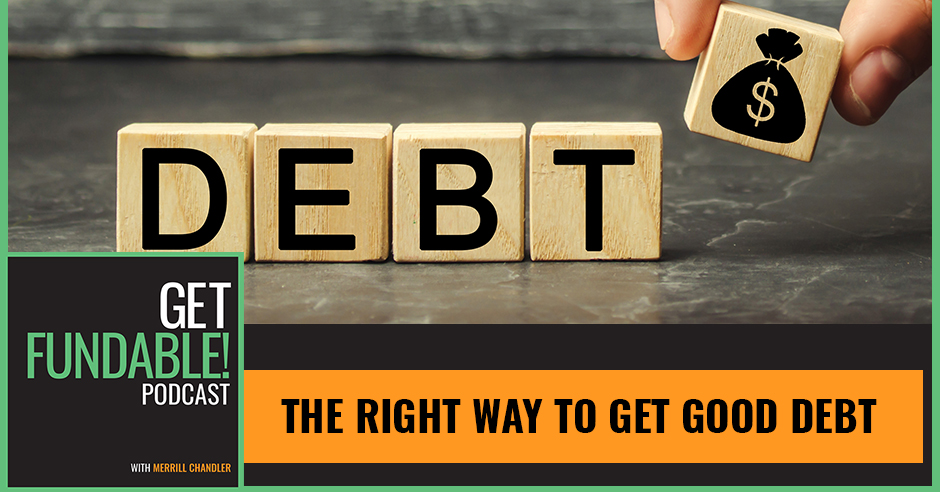
Debt is such a scary concept for most of us. After all, who would want to be living working to pay off something? But Merrill Chandler is here to help us overcome this overwhelming word and rethink what debt is to us, especially when planning for the future. In this episode, he discusses the difference between good and bad debt and what is the right way to get the former. Merrill then shares how to leverage debt in order to kill it in your entrepreneurial and real estate investing enterprises. Join in on this discussion and find out how cool debt is if you know what you’re doing.
—
Watch the episode here
Listen to the podcast here
The Right Way To Get Good Debt
Rethinking Debt When Planning Your Future
In this episode, we’re talking about how cool debt is if you know what you’re doing. We’re also going to be talking about folks who are checking out the show and don’t know, some people believe that debt is bad. Most people don’t know that a certain kind of debt is not just good but spectacular. We’re going to do a deep dive into good versus bad debt, the evils and foibles of debt, and how to leverage debt in order to kill it in your entrepreneurial and real estate investing enterprises.
—
We get some pushback every once in a while from people who have come from other outfits, other belief systems, and folks out there preaching their various financial gospels. Every once in a while, we get people coming like, “I hate debt. Debt is bad. Debt is evil.” They make decisions about that debt and try to get out of debt as fast as possible, and then months, years, sometimes decades later, they come to me and say, “I want to get into real estate investing.” They have not got any financial records, no FICO scores. No lending software can evaluate them. They’re angry and frustrated because they were misled about how debt works and that there is a difference between good debt and bad debt. That’s what we’re talking about.
Strategic Debt
Instead of calling it good debt, why don’t we call it strategic debt? Strategic debt is debt that we can leverage. I would normally call it leverageable, but that’s a big ass word. Let’s break this down. Bless his heart, Dave Ramsey, is one of the big proponents of living debt-free. Buy everything with cash, put everything in savings and live out off the grid. Live out of the financial system. Here’s the challenge. First of all, to his credit, Dave Ramsey began to preach this particular financial philosophy as a result of a crippling bankruptcy in his twenties. Because he had this untenable relationship with debt, got overwhelmed by debt, and then had circumstances in his life be able to not make those payments, he had to file a bankruptcy. He said, “Not me ever again. I’m going to teach people that there’s another way.”
His ability to share this financial philosophy is a reaction to circumstances that were in his life that created a horrible circumstance of which bankruptcy was the final solution. Is debt bad? As with everything that I do, I ask, what is your Z? What’s the end game? What do you want out of your life? If you know yourself so well and you know, “I am going to be a W-2 employee for the rest of my life. I am never going to be an entrepreneur, take risks with money, and leverage my relationships and my financial reputation for personal gain.” If you know yourself well enough to answer and be able to say that “I am never,” then living debt-free is likely for you.
Remember, never is a universal term. When I say never, I’m not saying for the next five or ten years. I’m saying never. You are going to retire as a W-2 individual after 20 to 30 years of working for the company and then you’re going to take your savings, take your pension. You’re going to live off of that for the rest of your life using savings strategies and retirement strategies, but you’re never going to try to leverage other people’s money as part of your end game if you know yourself that well, then debt-free is likely for you. Living debt-free, Dave Ramsey, maybe the answer for you.
Debt is cool if you know what you're doing. Share on XHere’s the problem. Let me tell you a story. The reason why I shared with you that the nevers, all those nevers that I outlined, there was a gentleman, Dave. Dave comes to me after he hears my presentation at a real estate investors conference. He comes to me and goes, “I’m excited. I would like to be able to get money for my business and then use those funds for my business and build a real estate investing career.” I’m like, “Let’s take a look at your personal credit profile.”
He goes, “I don’t have one.” Most Dave-ites, Ramsey-ites, debt-free-ites, whatever you want to call the collection of persons who don’t believe in debt, there is misinformation that you can get business credit without a personal profile. That has never been true. Not even before my normal cutoff of 2008, but business lending changed in 2008. You still needed a personal credit profile, unless you were getting Uline accounts and retail cards and gas cards, which are not going to help you build a real estate investment business.
The problem is, is this guy comes and he wants me to help him get business credit without a profile that goes, “No, I don’t believe in debt.” I was quick to share with him, “Business debt is debt.” He’s like, “I don’t want it on my personal name.” I’m like, “Sir, I would love to help you, but what you believe is true in this world is not the case. It’s not true. You cannot get business lines of credit, business loans, even business credit cards just on your business. They have to pull your personal credit profile.” He goes, “What if I don’t have one?” At this point, I was getting a little frustrated because he couldn’t connect the dots.
He wasn’t doing the math. I said, “You’re not going to get business credit. Never you are going to get the type of business credit you want. Yes, you can get a Uline account by working the Dun & Bradstreet PAYDEX score. Yes, you can get a Staples card for your business. That’s not personally guaranteed. You’re never going to get a business loan line of credit or likely a business credit card without personally guaranteeing those things. The only way you’re going to personally guarantee it is if they pulled your personal credit and go, ‘I love this borrower. I want to give him money too.’”
Dave became a client and we helped him build from scratch like a brand new eighteen-year-old client. We took Dave and we built a fundable personal profile, which he then was able to leverage into the things, but it took him several years. Why several years? Remember how we talked about the 24-month look-back period? Not a single account you have on your personal profile is meaningful until it’s 24 months old. Your credit cards don’t count for anything. They help build a score, but we aren’t interested in the score. We’re interested in underwriting guidelines and hitting the underwriting bullseye.

Good Debt: You cannot get business lines of credit, business loans, even business credit cards just on your business. They have to pull your personal credit profile.
Fear Of Debt
A brand new credit card doesn’t mean anything to FICO or underwriters until it’s 24 months old. To build a 24-month-old profile, we need to take 24 months and then we have to build a relationship with the lender. If you are starting from nothing, this can be a timely process, but the thing we got to remember is that the fear of debt is because people are afraid that they may not have longevity in their business or in their employment. Nothing on the hospitality industry, but if you’re in the hospitality industry, servers, hosts or hostesses, working for hotels or motels, anybody in the hospitality industry, COVID hit it and gutted the whole thing. You might move from place-to-place.
We have a friend, he gets a waiting job up at Park City, skis all a whole season, works his tail off as a waiter, then he comes back down to Salt Lake City and waits tables down here. Nothing on the hospitality industry, but if you do not have the capacity to create a financial reputation with lenders, you can lose that job quickly or shift that job, we don’t show consistency, so we begin to jeopardize our relationship with banks and future funding because nobody knows. They can’t count on whether or not we’re going to be employed tomorrow, next month, or next year. Some of us don’t like debt because we don’t know if we’re going to be employed in a particular industry.
We had clients who came in when the oil prices were such that it allowed for fracking up in South Dakota. We had hordes of Utahns go up into Eastern Utah and the Dakotas and get on these crews. They’re making money hand over fist, but it wasn’t consistent such that they knew that they would be employed 3 months or 6 months later. It was almost like the gig economy. They were doing a gig at these oil sites. Many of us don’t like debt because we don’t trust where next month’s paycheck is coming from, then you’re likely not going to be interested in fundability™ or what fundability™ can do for you. There are a number of people who say, “I hate what I’m doing. I want to get consistent. I want to build a funding framework and build my fundability™.” You start thinking with a different mentality. That’s who I serve. You are my tribe.
Those of you, you could hate debt for 30 years, but the second you want to build a personal profile and build business credit, then I’m all yours. I will serve you until my dying day, but you’ve got to understand that we’re borrowing other people’s money and that other people’s money, the cheapest money out there is bank money. Banks use underwriting systems, especially automatic underwriting systems. We got to hit those markers. Do you see the dominos falling here? Every one of those dominoes falls. That means we have to build a robust and powerful, fundable personal profile and then leverage that over on the business.
Leverageable Debt
Cutting to the quick, there’s no such thing as functional business credit without a personal profile and without you being the personal guarantor. It doesn’t exist. It hasn’t since 2008. Now, we talk about leverageable debt or strategic debt. People look at me before they get into the bootcamp and understand the details of it. I understand this is a huge topic, so people are mystified, but since most of us still believe old, false beliefs about credit and about business funding, we then have to break those chains. We got to cut through the old beliefs before we can start embracing the new beliefs. When I say we want strategic debt so that we can leverage that into making our real estate investing, entrepreneurial endeavors prosper, there is very little debt we have to carry to look spectacular.
Strategic debt is debt that we can leverage. Share on XThink of it this way. Ultimately, if you’ve been bingeing any of these for any amount of time, we know that we love a mortgage on our credit profile. It doesn’t matter the amount. We love an auto loan on our credit profile and we want at least three high-value credit cards. Go to the bootcamp if you need any definitions about how to get those, GetFundableBootcamp.com. Those three credit cards, we want to charge 10% to 20% traffic and paid a zero, so we’re not carrying debt. Ultimately, we want the sum of the credit cards to be at least $20,000 because that’s the minimum business line of credit that we want on the business side.
If we want $30,000, $50,000, or $100,000 on the business side, then we want to grow our personal debt capacity. I’m saying debt capacity, not debt load. It’s not like you’re going to charge up all three credit cards. Let’s say you have $30,000 in credit cards, three tens. You’re not charging them all up. That’s not what fundability™ is. We don’t want that debt. We want strategic debt. We want one mortgage, one auto loan, and at least three high-value credit cards. For those high-value credit cards, we put traffic on them every single month. We don’t carry balances. That’s bad debt. Personal revolving accounts are bad debt. That falls into, “Runaway, warning Will Robinson,” says the robot on Lost in Space. We want traffic on those credit cards, meaning charge ups and pay downs, but we want near-zero or zero balances at the end of the month on the due date. The only debts I’m talking about are your home and your car.
There are even ways to play that game so that you have the lowest possible debt load, but here’s the thing. It’s funny that it’s the case of two Dave’s. We’re talking about Dave Ramsey and then David, the gentleman who came to me who wanted to get into real estate investing in the story I was telling. When we set up his profile, when he becomes a successful borrower, he’s like, “I had no clue that this is what makes you fundable. I don’t have a lot of debt. I have traffic on credit cards, a house and a car, but now I’m getting business lines of credit, business loans, and business credit cards that don’t report to my personal. As a result, I’m going to be able to get all of this leverageable business credit and not put it on my personal profile.”
We’re not going to kill the goose that lays the golden egg. We want to nurture that goose and make it healthy, happy, and terrific. I remember I tell you what the perfect profile looks like, but for those of us who don’t have that perfect profile, there are ways to make it perfect. This is what I mean by strategic debt instruments. We believe in strategic debt instruments, not in consumer debt. That’s not what we’re talking about. The last thing is that we only want credit instruments that are on our personal profile that is going to serve us over the long-term to build business credit. Another thing is a wonderful debt instrument that is insanely strategic are HELOCs, Home Equity Lines of Credit. So much so that I tell clients that if you can find a HELOC as your first mortgage, don’t get a mortgage loan, get a mortgage HELOC.
Let’s say your home is worth $150,000. You could get a loan for $100,000 or you could get a home equity line of credit for $100,000. It’s a little more expensive, but if you’re trying to leverage that money, those borrowed funds for investments or for hard money loans, private loans, buying inventory, that home equity line of credit, every time you make a payment, you’re giving yourself more of a credit line to use for growing your real estate or entrepreneurial enterprises. I am the biggest fan of Home Equity Lines of Credit so much that I prefer them in the first position rather than having a loan and putting a smaller HELOC in the second position. I love first position HELOCs.

Good Debt: There is no such thing as good debt and bad debt. There are people who want to leverage money and want strategic opportunities to do so.
We had one client who was a great real estate investor but was really conservative financially. Almost Dave Ramsey in nature, but he learned and he embraced this whole idea of having leverageable debt. When I taught him the principle of HELOCs in the first position, he’s like, “Do you know what this means? When I pay off a loan, I’m literally paying off it and then I have all this equity and no access. It looks good on my personal balance sheet, but I have no access to it. Merrill, you’re telling me to put a HELOC in the first position so that when I pay it down as fast as I can, I still have a real estate loan reporting on my personal profile.” He goes, “I got ten properties.” I’m like, “Get ten HELOCs.”
He thought I was a genius. He’s like, “Merrill, I have $200,000 here, $400,000 here, $50,000 here. I have over $1.2 million available to me if I used HELOCs as my mortgage instrument.” I’m like, “Yeah, you do. You can write a check and do a deal like a mad person.” That’s what I call strategic debt. Ramsey and others say, “Pay off your mortgage as fast as possible.” I am saying, pay off your mortgage as fast as possible if your mortgage is a HELOC so that every dollar that you pay down gives you more resources to use to build your empires. In that, he and I are aligned. I’m saying, pick the right instrument and you will be the genius because now, you got to write a check and do a deal. This isn’t even including the business lines of credit that you can get through the fundability™ process, the funding formula. That’s what we’re talking about.
Interest Is “Bad”
The final thing that I would like to say, and this comes up in my bootcamps all the time. I want to fast forward to the answer here. People have been led to believe that interest is bad. Interest is bad if you live your life and you run your business from a P&L standpoint instead of a balance sheet. What do I mean by that? P&L is income and expenses. That’s how you determine your profits. Your balance sheet is assets and liabilities but this determines your net worth.
If you had $10 million in gold bullion, would you likely pay some expense category, safe deposit box, security system, or a private banking vault rent space there? Would you pay money to protect that asset? Yes, you would. All of us would. What you’re telling me there is if I have this asset, I’m willing to spend money every month to protect that asset. Until this moment, we may not have connected the dots. Your single greatest financial asset is your personal borrower profile. Somebody tells me, “Merrill, I got $1 million. I don’t need to leverage anything because I got $1 million.” I’m like, “Congratulations. What if that $1 million could create $3 million to $5 million worth of credit lines? Would you rather work with $1 million or $3 million to $5 million in building your empire?”
That’s how money works. You put money into 1 of 5 accounts and you show the right traffic patterns, you build the right relationships with $200,000 each and you can grow those credit lines over and over again. Ultimately, they’re not secured because you built the relationship with the lender that proves you know how to use their money and they will give you more and more increases in those credit lines. I’m not interested in how much cash you have, I’m interested in how you can leverage that cash. Some people say, “No, $1 million is all the money I need to do all the real estate or all the Amazon stores. That’s everything that I need.” I’m like, “Godspeed, do your thing because right now, I got not much to help you with.” If you are the one who says, I got $1 million in cash, but I want $3 million in credit lines, then of course, I’m going to show you how that I can help you with.
Paying interest is the gift you give for that lender believing in you. Share on XBack to our assets, the $1 million is not an asset. It’s the financial reputation to be able to leverage that $1 million into $3 million, $4 million, $5 million, or more. Your financial reputation is worth more than the $ 1 million is. If that’s the case, what are you willing to do to protect that asset? Are you willing to spend money to protect the asset? That is the million-dollar question because the way we protect our borrower profile and our financial reputation is by paying interest. When you pay interest on a vehicle loan or on your home loan, you’re telling the banks, “Please measure my borrower behavior because I want to partner with you. I want us to do more deals together.” That’s what you’re, in effect, saying to the bank.
On the business side, you can hold balances and pay interest which puts more money into the bank’s coffers which makes you a more valuable client. You’re a more valuable banking partner. A more valuable borrower. I have two messages about interest. One, interest is our investment in a long-term partnership with a lender. A profitable partnership with lenders, 2, 3, 5, 7, 10 of them. The other thing which is more that speaks to my heart. Paying interest is the gift you give for them believing in you. Let’s get away from automatic underwriting guidelines, FICO 40 borrower behaviors, and all of the things that you’re doing right to receive money.
Paying interest is the gift you give for that lender believing in you. If you come from that abundance and generosity space, we’re in this together. You deserve to make some money out of the deals that I’m doing too. You’re going to have a wildly successful entrepreneurial practice or business because you’re investing in that relationship, but your headspace, your mind space is literally saying, “Thank you. Here is 6%, 5% on a credit line, 12% to 14% on a credit card, 6% on a business loan. I’m paying you that money, gratefully and graciously.”
Generously pay the interest for the money we’re making or the tool that they’ve given us. By believing in us, they give us a tool that we can make our dreams come true with. That is the best thing that you can do. Bottom line, our take-home message is there is no such thing as good debt and bad debt. There are people who want to leverage money and want strategic opportunities to do so. Bad debt is only what keeps a lender from lending to you. Your consumer cards, your high personal balances, that’s all bad debt if we’re to frame it that way, but there’s fundable debt and then there’s unfundable debt.
I want to get out of the good and bad and go to the fundable, unfundable as I always like to do. Think of how you can give back to your lenders, how you can partner with them because they have believed in you. You’ve proven up. You’ve got great stats. We’re using the NBA draft as a metaphor that I always use. If you’ve got great stats, they want to recruit you, and they want to give you the ball. If you know how to dunk that basketball every time they give you that ball, then they’re going to put you on the court over and over again. That is the same as any credit line business loan or otherwise. My job, my mission in life is to help make getting funding for you easy. Have a great day.
Important Link
Love the show? Subscribe, rate, review, and share! http://getfundablepodcast.com/




